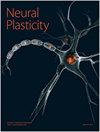Growth Hormone Increases BDNF and mTOR Expression in Specific Brain Regions after Photothrombotic Stroke in Mice
IF 3.7
4区 医学
Q2 Medicine
引用次数: 1
Abstract
Aims We have shown that growth hormone (GH) treatment poststroke increases neuroplasticity in peri-infarct areas and the hippocampus, improving motor and cognitive outcomes. We aimed to explore the mechanisms of GH treatment by investigating how GH modulates pathways known to induce neuroplasticity, focusing on association between brain-derived neurotrophic factor (BDNF) and mammalian target of rapamycin (mTOR) in the peri-infarct area, hippocampus, and thalamus. Methods Recombinant human growth hormone (r-hGH) or saline was delivered (0.25 μl/hr, 0.04 mg/day) to mice for 28 days, commencing 48 hours after photothrombotic stroke. Protein levels of pro-BDNF, total-mTOR, phosphorylated-mTOR, total-p70S6K, and phosporylated-p70S6K within the peri-infarct area, hippocampus, and thalamus were evaluated by western blotting at 30 days poststroke. Results r-hGH treatment significantly increased pro-BDNF in peri-infarct area, hippocampus, and thalamus (p < 0.01). r-hGH treatment significantly increased expression levels of total-mTOR in the peri-infarct area and thalamus (p < 0.05). r-hGH treatment significantly increased expression of total-p70S6K in the hippocampus (p < 0.05). Conclusion r-hGH increases pro-BDNF within the peri-infarct area and regions that are known to experience secondary neurodegeneration after stroke. Upregulation of total-mTOR protein expression in the peri-infarct and thalamus suggests that this might be a pathway that is involved in the neurorestorative effects previously reported in these animals and warrants further investigation. These findings suggest region-specific mechanisms of action of GH treatment and provide further understanding for how GH treatment promotes neurorestorative effects after stroke.生长激素增加小鼠光血栓性中风后特定脑区BDNF和mTOR的表达
我们已经证明,脑卒中后生长激素(GH)治疗增加了梗死周围区域和海马的神经可塑性,改善了运动和认知结果。我们的目的是通过研究生长激素如何调节已知的诱导神经可塑性的途径来探索生长激素的治疗机制,重点研究脑源性神经营养因子(BDNF)和哺乳动物雷帕霉素靶蛋白(mTOR)在梗死周围区、海马和丘脑中的关联。方法在光血栓性脑卒中后48 h,给药小鼠重组人生长激素(r-hGH)或生理盐水(0.25 μl/hr, 0.04 mg/day) 28 d。脑卒中后30天,采用western blotting检测梗死周围区、海马和丘脑中pro-BDNF、总mtor、磷酸化mtor、总p70s6k和磷酸化p70s6k的蛋白水平。结果r-hGH显著提高了梗死周围区、海马和丘脑中bdnf的表达(p < 0.01)。r-hGH显著提高梗死周围区和丘脑总mtor表达水平(p < 0.05)。r-hGH处理显著增加海马总p70s6k的表达(p < 0.05)。结论r-hGH增加脑卒中后梗死周围区域和已知发生继发性神经退行性变的区域的bdnf。梗死周围和丘脑中总mtor蛋白表达的上调表明,这可能是一种参与先前在这些动物中报道的神经恢复作用的途径,值得进一步研究。这些发现提示了生长激素治疗的区域特异性作用机制,并为生长激素治疗如何促进脑卒中后神经恢复作用提供了进一步的理解。
本文章由计算机程序翻译,如有差异,请以英文原文为准。
求助全文
约1分钟内获得全文
求助全文
来源期刊

Neural Plasticity
Neuroscience-Neurology
CiteScore
5.70
自引率
0.00%
发文量
0
审稿时长
1 months
期刊介绍:
Neural Plasticity is an international, interdisciplinary journal dedicated to the publication of articles related to all aspects of neural plasticity, with special emphasis on its functional significance as reflected in behavior and in psychopathology. Neural Plasticity publishes research and review articles from the entire range of relevant disciplines, including basic neuroscience, behavioral neuroscience, cognitive neuroscience, biological psychology, and biological psychiatry.
 求助内容:
求助内容: 应助结果提醒方式:
应助结果提醒方式:


